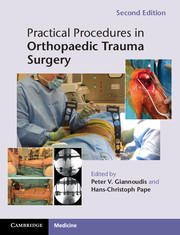Book contents
- Frontmatter
- Dedication
- Contents
- List of Contributors
- Preface
- Acknowledgements
- Part 1 Shoulder girdle
- Part 2 Upper extremity
- 3 Section I: Fractures of the proximal humerus
- 4 Section I: Fractures around the elbow
- 5 Section I: Fractures of the proximal radius
- 6 Fractures of the wrist
- 7 Section I: Fractures of the first metacarpal
- Part 3 Pelvis and acetabulum
- Part 4 Lower extremity
- Part 5 Spine
- Part 6 Tendon injuries
- Part 7 Compartments
- Index
3 - Section I: Fractures of the proximal humerus
Published online by Cambridge University Press: 05 February 2014
- Frontmatter
- Dedication
- Contents
- List of Contributors
- Preface
- Acknowledgements
- Part 1 Shoulder girdle
- Part 2 Upper extremity
- 3 Section I: Fractures of the proximal humerus
- 4 Section I: Fractures around the elbow
- 5 Section I: Fractures of the proximal radius
- 6 Fractures of the wrist
- 7 Section I: Fractures of the first metacarpal
- Part 3 Pelvis and acetabulum
- Part 4 Lower extremity
- Part 5 Spine
- Part 6 Tendon injuries
- Part 7 Compartments
- Index
Summary
Introduction
The practicalities of surgical management of proximal humeral fractures are common to the various injuries treated. A generic description of the investigations required and the practical set-up of the operating room will therefore be presented before discussing specific injuries.
Radiological assessment
It is essential that all shoulder fractures be assessed with a minimum of two shoulder views – anteroposterior and axial views.
A scapular lateral completes the trauma series but is not always essential.
The axial view can be obtained successfully in most cases. In the rare instances where the patient will not permit sufficient movement of the injured limb away from the side, angled views (modified axial) should be obtained. Never miss a dislocation (too many are missed, and most of these have not had an axial view taken).
In complex cases a CT scan might assist, particularly in assessing whether the humeral head is intact and has any tuberosity attachments remaining. A humeral head fragment with an attached tuberosity is much less likely to suffer avascular necrosis than one with no remaining tuberosity attachments. 3D CT is particularly useful for assessing glenoid fossa fractures.
Information
- Type
- Chapter
- Information
- Practical Procedures in Orthopaedic Trauma Surgery , pp. 16 - 36Publisher: Cambridge University PressPrint publication year: 2014
